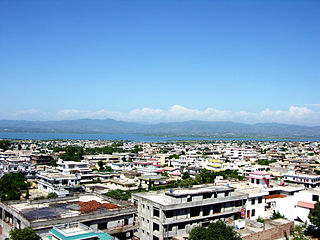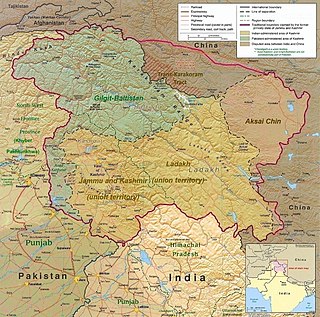Related Research Articles

Azad Jammu and Kashmir, abbreviated as AJK and colloquially referred to as simply Azad Kashmir, is a region administered by Pakistan as a nominally self-governing entity and constituting the western portion of the larger Kashmir region, which has been the subject of a dispute between India and Pakistan since 1947. Azad Kashmir also shares borders with the Pakistani provinces of Punjab and Khyber Pakhtunkhwa to the south and west, respectively. On its eastern side, Azad Kashmir is separated from the Indian union territory of Jammu and Kashmir by the Line of Control (LoC), which serves as the de facto border between the Indian- and Pakistani-controlled parts of Kashmir. Geographically, it covers a total area of 13,297 km2 (5,134 sq mi) and has a total population of 4,045,366 as per the 2017 national census.
The Indo-Pakistani war of 1947–1948, also known as the first Kashmir war, was a war fought between India and Pakistan over the princely state of Jammu and Kashmir from 1947 to 1948. It was the first of four Indo-Pakistani wars between the two newly independent nations. Pakistan precipitated the war a few weeks after its independence by launching tribal lashkar (militias) from Waziristan, in an effort to capture Kashmir and to preempt the possibility of its ruler joining India.

Muzaffarabad is a city in Pakistani-administered Azad Kashmir in the disputed Kashmir region. It is the largest city and the capital of Azad Kashmir, which is a Pakistani-administered administrative territory.

Mirpur, officially known as New Mirpur City, is the capital of Mirpur district located in Azad Kashmir, Pakistan which has been subject of the larger Kashmir dispute between Pakistan and India since 1947. It is the second largest city of Azad Kashmir and the 74th largest city in Pakistan.

Bagh District is a district of Pakistan-administered Azad Kashmir in the disputed Kashmir region. It is one of the ten districts of Azad Jammu and Kashmir. Previously part of Poonch District, Bagh was established as a separate district in 1988.

Poonch District is a district of Pakistan-administered Azad Kashmir in the disputed Kashmir region. It is one of the 10 districts of this Pakistan-administered territory. It is bounded on the north by Bagh District, on the north-east by Haveli District, on the south-east by the Poonch District of Indian-administered Kashmir, on the south by Azad Kashmir's Sudhanoti and Kotli districts, and on the west by Rawalpindi District of Pakistan's Punjab Province. The Poonch District is part of the greater Kashmir dispute between India and Pakistan. The district headquarters is the city of Rawalakot. It is the third most populous district of Azad Kashmir.

Uri is a town and a tehsil in the Baramulla district, in the Indian union territory of Jammu and Kashmir. Uri is located on the left bank of the Jhelum River, about 10 kilometres (6.2 mi) east of the Line of Control with Pakistan.

Rawalakot is the capital of Poonch district in Azad Kashmir, Pakistan. It is located in the Pir Panjal Range.
The following is a timeline of the Kashmir conflict, a territorial conflict between India, Pakistan and, to a lesser degree, China. India and Pakistan have been involved in four wars and several border skirmishes over the issue.

Sardar Muhammad Ibrahim Khan was a revolutionary leader and politician from the western region of Jammu and Kashmir, who led the 1947 Poonch Rebellion against the Maharaja in the state of Jammu and Kashmir and played a key role in the First Kashmir War, supporting Pakistan. He served as the President of Azad Kashmir for 13 years across four non-consecutive terms and still remains the longest-serving president of the state, since its establishment.

Sudhan are one of the major tribes from the Poonch Division in Azad Kashmir with their population centered around Poonch and Sudhanoti, alongside a smaller population in the northern areas of the neighboring Bagh and Kotli. According to the local oral tradition of the tribe, they are allegedly a branch of the Saddozai tribe and originated from Pashtun areas in Afghanistan, and were the founders of their heartland of Sudhanoti.

Bhimber is a town and the headquarters of the eponymous district in Pakistan-administered Azad Kashmir. The town and district are between the Jammu region of Indian-administered Kashmir and Pakistan proper, about 47 km (29 mi) by road southeast of Mirpur.

Poonch Jagir, also called Poonch district, was former semi-autonomous region in the princely state of Jammu and Kashmir. The territory was divided between India and Pakistan in 1947, represented by the present-day Poonch Division of Azad Kashmir and Poonch District of Jammu and Kashmir.

The Haveli District is a district of Pakistan-administered Azad Kashmir in the disputed Kashmir region. It is one of the 10 districts of the Pakistan-administered territory of Azad Kashmir. It was previously a tehsil of the Bagh District but was promoted to the district status on 1 July 2009.

The history of Azad Kashmir, a disputed part of the Kashmir region currently administered by Pakistan, is related to the history of the Kashmir region during the Dogra rule. Azad Kashmir borders the Pakistani provinces of Punjab and Khyber Pakhtunkhwa to the south and west respectively, Gilgit–Baltistan to the north, and the Indian union territory of Jammu and Kashmir to the east. The region is claimed by India and has been the subject of a dispute between India and Pakistan since 1947.
The Azad Kashmir Regular Force (AKRF), formerly known as the Kashmir Liberation Forces(KLF), were the irregular forces of Azad Kashmir until 1948. They then were taken over by the government of Pakistan and converted into a regular force. In this form, the unit became part of the country's paramilitary forces, operating out of the nominally self-governing territory of Azad Jammu and Kashmir. The AKRF was altered from a functioning paramilitary force and merged into the Pakistan Army as an infantry regiment following the Indo-Pakistani War of 1971.

After the Partition of India, during October–November 1947 in the Jammu region of the princely state of Jammu and Kashmir, many Muslims were massacred and others driven away to West Punjab. The killings were carried out by extremist Hindus and Sikhs, aided and abetted by the forces of Maharaja Hari Singh. The activists of the Rashtriya Swayamsevak Sangh (RSS) played a key role in planning and executing the riots. An estimated 20,000–100,000 Muslims were massacred. Subsequently, many non-Muslims were massacred by Pakistani tribesmen, in the Mirpur region of today's Pakistani administered Kashmir, and also in the Rajouri area of Jammu division.
The 1955 Poonch revolt, also known as the 1955 Sudhan uprising was a Civil revolt in Azad Jammu and Kashmir against the State of Pakistan. The uprising broke out in February 1955 and was provoked largely by the dismissal of Sardar Ibrahim Khan. It took a year until the uprising was suppressed in October 1956.

In spring 1947, an uprising against the Maharaja Hari Singh of Jammu and Kashmir broke out in the Poonch jagir, an area bordering the Rawalpindi district of West Punjab and the Hazara district of the North-West Frontier Province in the future Pakistan. It was driven by grievances such as high taxes, the Maharaja's neglect of World War veterans, and above all, Muslim nationalism with a desire to join Pakistan. The leader of the rebellion, Sardar Ibrahim Khan, escaped to Lahore by the end of August 1947 and persuaded the Pakistani authorities to back the rebellion. In addition to the backing, Prime Minister Liaquat Ali Khan authorised an invasion of the state, by the ex-Indian National Army personnel in the south and a force led by Major Khurshid Anwar in the north. These invasions eventually led to the First Kashmir War fought between India and Pakistan, and the formation of Azad Kashmir provisional government. The Poonch jagir has since been divided across Azad Kashmir, administered by Pakistan and the state of Jammu and Kashmir, administered by India.
Justice Muhammad Yusuf Saraf was the Chief Justice of the Azad Kashmir High Court and the author of the voluminous work, Kashmiris Fight for Freedom. He was born in Baramulla in the then princely state of Jammu and Kashmir, but migrated to Pakistan prior to the Partition of India. He started practising law in Mirpur in 1949, rising to the bench in 1969. He served as the Chief Justice of Azad Kashmir from 1975 to 1980.
References
- ↑ "Reimagining Kashmir". The Hindu. 1 March 2013. Retrieved 31 October 2014.
- 1 2 3 Christopher J. G. Snedden, Ph.D. Daniel K. Inouye Asia-Pacific Center for Security Studies, Retrieved 23 February 2017.
- 1 2 Kanth, Idrees. "The Untold Story of the People of Azad Kashmir - Book Review". Politics, Religion and Ideology. 14 (4): 589–591. doi:10.1080/21567689.2013.838477. S2CID 144444255.
- ↑ B. G. Verghese, Blinkered history of Kashmir dispute (Review of Christopher Snedden's Kashmir: The Unwritten History), The Tribune (Chandigarh), 28 April 2013.
- ↑ Kumar, Satish (2012). "Book Review: Christopher Snedden, Kashmir: The Unwritten History". International Studies. 49 (3–4): 449–451. doi:10.1177/0020881714534539. S2CID 155812870.
- ↑ Singh, Priyanka (2013), "Pakistan-Occupied Kashmir on the Periphery", Strategic Analysis, 37 (1): 128–135, doi:10.1080/09700161.2013.737594, S2CID 154034362